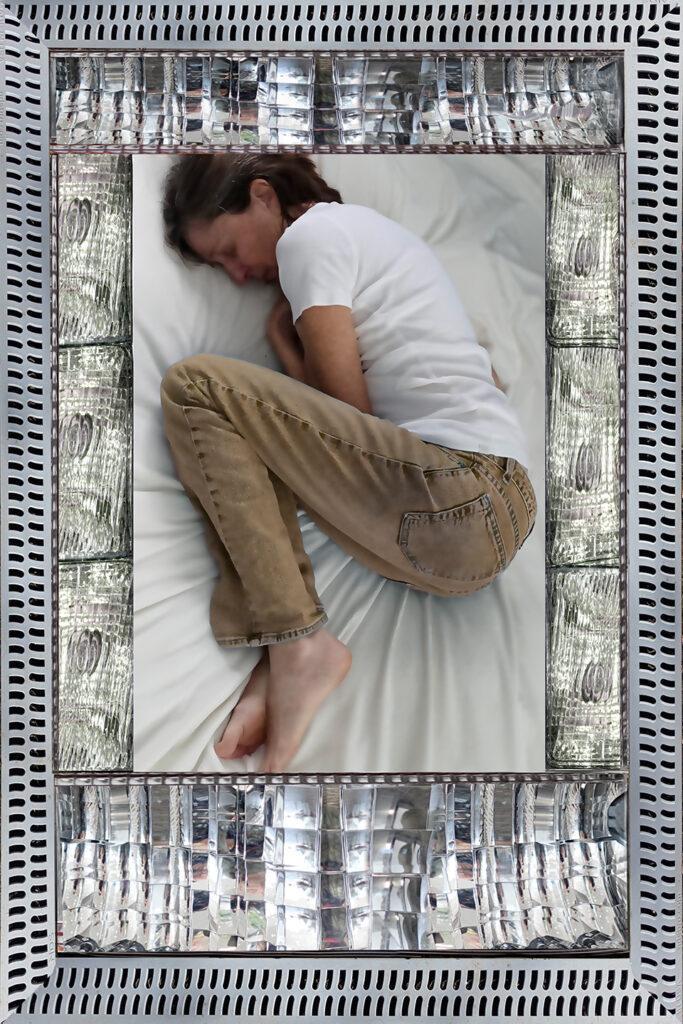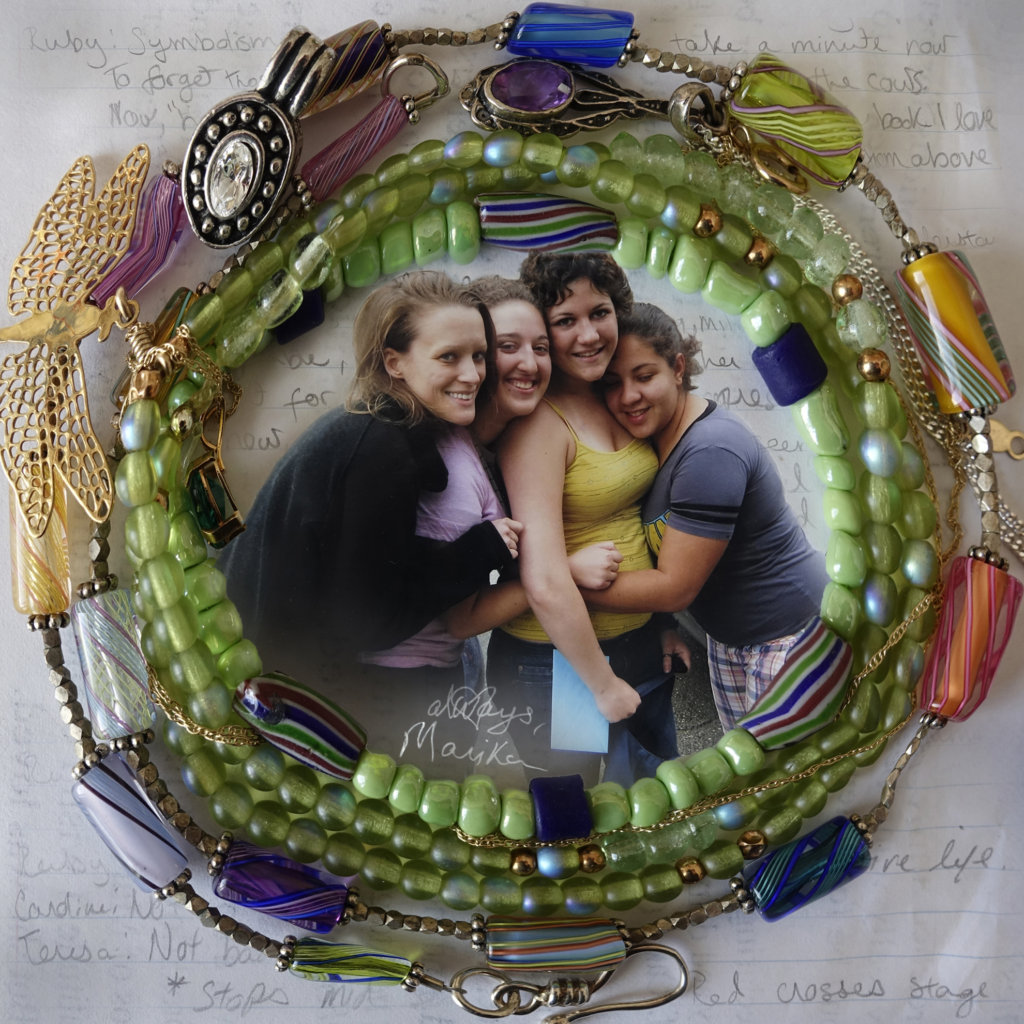Driving home one autumn day, a police car blinks bright lights and trails me until I pull over in disbelief. It is Officer Barr, the same Officer Barr who had stopped me in the exact same spot years before, after my divorce. And here he is again, telling me I was speeding, but this time he also notices my inspection is three months overdue.
Waiting for him to do whatever cops issuing tickets do back in their vehicles flashing dazzling lightshows, I sit low in the car hoping no one driving by will recognize me. I look over at the seat where Marika used to sit, where, if she were here now, she’d be rolling her mascaraed eyes at me. Why always me, I’m kicking myself, why can’t I just become invisible? Officer Barr taps on the window. He looks no different from when I saw him eight years ago.
“It behooves you to go to court,” he says, handing me two tickets on four pieces of curled paper. And all I can think is, I need a break. Maybe I shouldn’t leave home for another year or two. What do I say in court? What do I wear in court? Should I “pull the cancer card” as Marika used to say? The ‘my-daughter-just-died-of-cancer card?’
For two weeks I wail about the tickets. I pick out and toss aside various outfits for my day in court. Friends warn me I will pay over a thousand dollars between the two fines and the surcharges. I cry over the phone to my friend Celia,
“I’m a wreck. I don’t know if it’s the court date or the rewriting of chapter ten.”
“What’s chapter ten?” Celia asks.
“It’s the one where Marika dies,” I say, trying to hold back the floodwaters swelling in my head. “No, it can’t be chapter ten. This is my third rewrite; Marika’s died a hundred times for me in my manuscript this past year, and I’ve never had a reaction like this.”
“You’ve got a lot going on,” Celia sympathizes.
On the October day I am to account for my deviant behavior, wearing a rust-colored skirt and sweater, I settle myself into the wooden pew-like benches of the Ithaca City Court. I survey the scene to find a familiar face, to figure out where I fit in, and if I am over or underdressed. A man in a black suit stands before the judge and is told to pay four dollars to a local food store with which he’d had some entanglement. A redheaded preteen squirms in his seat, nudging his father who wears khaki shorts and rubs his face every five minutes, looking nervously from side to side. A thin, pale woman is six months pregnant, out of work and paying off hundreds of dollars of previous violations, five dollars at a time each month. The judge jokes with a young man in an orange jumpsuit who wears chains around his waist and wrists.
The judge is the one I feel the most kinship with. A neon pink shirt is barely concealed under her black robe. She looks like someone who would understand a fleeting loss of control, about being human and making mistakes. But Judge Rossiter never gets to hear my story. I do not get to stand before her to plead my case. She suddenly leaves the courtroom and the city attorney approaches. He waves my papers at me, the papers which show how I diligently got my inspection taken care of the day after Officer Barr stopped me.
“I’ll make you a deal,” the attorney says.
“Uh, is that how it’s done?” I ask doubtfully, wondering why no one else had been offered “a deal” and why the judge had gone without seeing me.
“I’m going to dismiss the ticket for the inspection and charge you fifty dollars for the speeding. That’s the deal.”
“This is legal?” I ask, looking around for witnesses and still praying I won’t get charged the thousand dollars my friends had predicted.
“You can wait and present your case to the judge, but she doesn’t make deals. I make the deals,” he says. It feels like a bribe. I have no excuse for the speeding and haven’t yet figured out what to say to the judge about it. “And there’s an eighty-dollar surcharge,” he adds. But my mind is already made up.
“I’ll take the deal,” I say, rising, my skirt clinging to the backs of my legs.
As I leave the courthouse I pass people in suits, in uniforms, in tee shirts and jeans, and in rags. There are people in wheelchairs, in chains, in tears, in defiance. Some are in dire straits. I walk by a hundred different stories. I’m out a hundred thirty dollars, but I still have my house, my son, my car, a bank account, my friends, my health, … my manuscript. It’s the first time since cancer came that I can remember counting my blessings.


 Saturday was my daughter’s sixth angelversary. Angelversary is the name bereaved parents often use to gently refer to the date of a child’s death. It marks the day a son or daughter became an angel. Or the day they took up a heavenly abode. I’m still on the fence about heaven and where one ends up after life. And Marika was no angel. But these wretched anniversaries wreak a range of emotions. What bereaved mothers and fathers really want, besides having their children back, is to know their child is loved and won’t be forgotten.
Saturday was my daughter’s sixth angelversary. Angelversary is the name bereaved parents often use to gently refer to the date of a child’s death. It marks the day a son or daughter became an angel. Or the day they took up a heavenly abode. I’m still on the fence about heaven and where one ends up after life. And Marika was no angel. But these wretched anniversaries wreak a range of emotions. What bereaved mothers and fathers really want, besides having their children back, is to know their child is loved and won’t be forgotten.